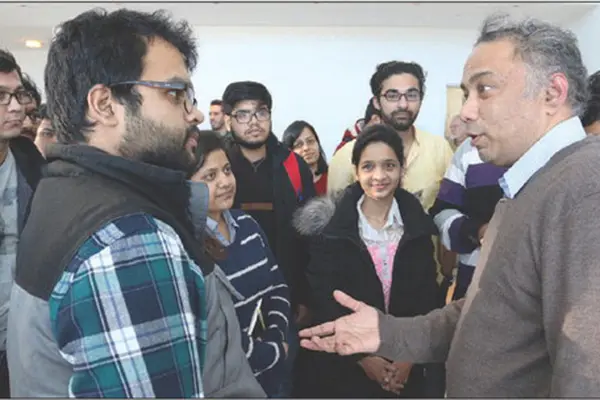Renewable power, lives empowered
 Image by John Love/Lowell Sun
Image by John Love/Lowell Sun
02/20/2017
Lowell Sun
By Brendan Lewis
LOWELL - He spoke about the power of renewable energy, and yes, how one man can touch the lives of a million. UMass Lowell welcomed back former masters and doctoral student Harish Hande to speak about how he was able to help so many poor in India find a renewable energy source to fit their needs exactly.
The 2011 winner of Asia's Nobel Peace Prize, the Magsaysay Award, Hande has provided power for many of the poorest areas in India, bringing energy to roughly 1 million people in various impoverished areas of India through solar power as well as other avenues.
With dozens of graduate and undergraduate students studying renewable energy coming to hear him speak Friday afternoon, Hande said he hopes students will take away many important facts from the talk and hopes it will motivate them to provide energy to the less fortunate.
But, more specifically, he said that when graduates are out in the world trying to apply these renewable energy solutions, it is important they cater their approach.
In one situation, Hande said he was speaking with someone who sold items at a market and wanted light for five hours during the daytime but only one hour at night.
"So I cut a hole in her roof and put up a composite sheet (that let light through) so she didn't need solar for six hours. She only needed it for one hour. Because the day lighting was enough," said Hande. "Suddenly solar became affordable to her. Had I designed it for six hours, she would have said it was too expensive.
"He said that he hopes students will be creative with their approaches so they can actually make a difference and not just provide energy solutions to people that can't afford it.
"That cross-learning should happen," said Hande. It all depends on what the power is being used for, Hande says, adding that people obviously need energy for a wide variety of reasons; for lighting, for health services, for water, etc. And it matters how much power is needed; is it for daytime and nighttime or just one?
"You have to look at the end value," said Hande. First year graduate student Smruti Landage came to hear Hande speak and is part of the renewable energy program with a concentration on solar at UMass Lowell.
"He was a very interesting personality and an encouraging one," said Landage, who is also Indian by nationality. "(He showed me that) we being engineers only of the solar, we are not only entitled to solar. We are here to solve the problems. We are just basically engineers. So the (study) concentrations don't matter."
While the talk was inspiring, one student commented on how he sees a large dilemma in bringing solar power to the poor in his country. Also a first-year graduate student but studying energy engineering with a solar concentration, Paulo Perillo, originally of Brazil, said his particular challenge is trying to bring renewable energy to some of the poorest areas of Brazil that don't even have steady food supplies.
"You just can't go to a village where people are starving and talk about energy," said Perillo. "You gotta talk about food first. So the root of the problem is so much deeper than you can imagine. I really doubt we could start to talk about solar power in Brazil right now."
Hande graduated from UMass Lowell with a master's degree in renewable energy engineering in 1998 and a doctorate in mechanical engineering (with a concentration in energy) in 2000. And prior to graduating, he co-founded the Solar Electric Light Company (SELCO) in Bangalore, India, in 1995.
However, he speaks much about UMass Lowell being one of the more progressive schools in regards to renewable energy.
"In the early 1990s, UMass Lowell was one of the very few universities that was offering courses on renewable energy and sustainability," said Hande.
In 2013, UMass Lowell awarded Hande an honorary doctorate of humane letters in recognition of all his work with SELCO.
